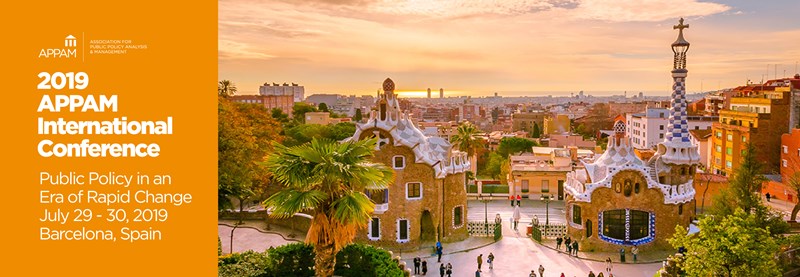2019 International Conference

Public Policy in an Era of Rapid Change
The 2019 APPAM International Conference in Barcelona, Spain was held on July 29 – 30, 2019. The Johns Hopkins University - University Pompeu Fabra (JHU-UPF) Public Policy Center co-hosted the conference. The conference featured more than 50 sessions and three plenaries. Attendees enjoyed receptions and generous lunch schedules for optimal networking opportunities.
The conference’s programming was inspired by this philosophy: There are new and emerging global challenges that warrant pragmatic and evidence-informed policy responses. Major political changes have been occurring on both sides of the North-Atlantic and other parts of the world, and new political forces have appeared that have impacted the context in which policies are being developed. These new realities create tremendous opportunities for public and social policies that respond to an array of political, economic, and social changes. Moreover, the beginning of the twenty-first century has seen the spectacular growth of social inequalities among and within countries. Each of these challenges have had an enormous impact on the quality of life, social well-being, and health populations, in addition to economic and political impacts.

Preliminary Program
Our Program features descriptions and speaker details of the conference sessions. It is searchable by day, session type, author, organization, and key words.
Blog Posts
Registration Rates
|
|
Early
(4/1/19 – 5/22/19)
|
Regular
(5/23/19 – 7/18/19)
|
On-Site
(7/29/19 – 7/30/19)
|
|
Student Member
|
$115
|
$140
|
$165
|
|
Professional Member
|
$260
|
$360
|
$415
|
|
Non-member
|
$315
|
$420
|
$460
|

2019 Schedule at a Glance
|
Monday, July 29th
|
| 8:00 am - 9:00 am |
Breakfast/Registration |
| 9:00 am – 10:30 am |
Opening Plenary Session:
Climate and the Ecological Crisis
With global warming trends proceeding at an unprecedented rate and the pace of biodiversity loss at 1,000 times higher than the natural extinction rate, deciding about the character and scale of public policy response to such exceptional circumstances poses considerable challenges. Moreover, the global character of environmental challenges intertwines them with international politics and multi-level governance, and so introduces additional layers of complexity. Policy responses seem to swing between incremental and transformational actions that seek to adapt to changes, or facilitate transitions to more sustainable socio-economic models. This session will present and reflect on the challenges of the science and policy interface around key issues of agriculture, transportation, and water resources, and consider the potential of certain policy responses to the climate and ecological crisis.
Speaker: Tom Burke - Johns Hopkins University
Reactor: James Connelly - Universitat Autònoma de Barcelona
|
| 10:45 am – 12:15 pm |
Concurrent Sessions |
| 12:30 pm – 1:15 pm |
Special Debate: Evidence-Based Public Policy in an Era of Rapid Change: Is It Feasible? . . . Or Must We Turn to Reasoned Policy by Other Means?
Participants in this plenary will debate the ability of empirical evidence to reliably guide public policy in a rapidly changing world, versus other reasoned criteria for policy choice such as constituent views or civic values. Scrutinizing the case of K-12 education policy, the first speaker will argue that research on the effectiveness of educational interventions, if creatively designed and undertaken with alacrity, can supply policymakers with reliable and up-to-date information in a fast-paced world. The second speaker will argue that other, non-evidentiary ways of guiding education policy should be formulated to more quickly and completely reflect rapid changes and produce reliable direction to policy-makers. The audience will be invited to take sides, as the moderator asks: “Which of these perspectives do you find convincing—and why? Where you are not convinced, what’s the problem?”
Moderator: Irma Perez-Johnson - American Institutes for Research
Speakers:
- Stephen Bell - Westat
- Brooks Bowden - University of Pennsylvania
|
| 1:15 pm – 2:00 pm |
Networking Lunch |
| 2:15 pm – 3:45 pm |
Concurrent Sessions |
| 4:00 pm - 5:30 pm |
Concurrent Sessions |
| 5:30 pm - 7:00 pm |
Poster & Welcome Reception |
|
Tuesday, July 30th
|
| 8:00 am – 3:30 pm |
Registration |
| 8:00 am - 9:15 am |
Morning Refreshments |
| 9:15 am – 10:45 am |
Morning Plenary:
Migration Policy and Its Global Impacts
This plenary will focus on modern migration policies and their impacts around the world. Speakers will include experts both on US and European migration challenges and the policies designed to ease them.
Moderator:
- Ayla Bonfiglio - Mixed Migration Center - North Africa
Speakers:
- Ricard Zapata - Pompeu Fabra University
- Roger Zetter - University of Oxford
|
| 11:00 am – 12:35 pm |
Concurrent Sessions |
| 12:30 pm - 1:30 pm |
Networking Lunch |
| 1:45 pm - 3:15 pm |
Concurrent Sessions |
| 3:30 pm - 5:00 pm |
Closing Plenary:
Structural Determinants of Social Inequities
The increase of social inequalities is one of the largest challenges humankind is facing in the 21st century. Social structural conditions and forces affect the wellbeing, quality of life, and health of the population as well as the generation of social inequities among different social groups and territories. Increasing evidence shows that these inequities exist between and within countries. This interactive plenary session will feature a conversation among the speakers, and between the speakers and audience, about topics such as what research is needed, policies that contributed to and increased inequities by race, gender, and class, among others, and the potential political and policy responses to eliminate these inequities.
Moderator: Lynette Rawlings - The Policy Academies
Speakers:
- Sylvia Allegretto - University of California, Berkeley
- Joan Benach - Pompeu Fabra University
- Vicente Navarro - Pompeu Fabra University
- Keshia Pollack Porter - Johns Hopkins University
|
| 5:00 pm – 6:30 pm |
Closing Reception |

Thank you to our 2019 Hosts
